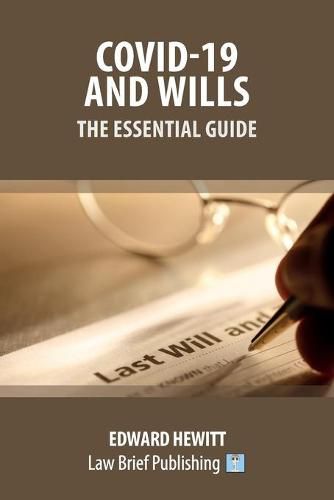Readings Newsletter
Become a Readings Member to make your shopping experience even easier.
Sign in or sign up for free!
You’re not far away from qualifying for FREE standard shipping within Australia
You’ve qualified for FREE standard shipping within Australia
The cart is loading…






This title is printed to order. This book may have been self-published. If so, we cannot guarantee the quality of the content. In the main most books will have gone through the editing process however some may not. We therefore suggest that you be aware of this before ordering this book. If in doubt check either the author or publisher’s details as we are unable to accept any returns unless they are faulty. Please contact us if you have any questions.
The Covid-19 pandemic has had a two-pronged impact on will making. On the one hand, the daily reporting in the media of an ever-increasing number of infections and deaths has undoubtedly galvanised people into putting their affairs in order, including by making a will. On the other hand, the imposition of a national lockdown and social distancing measures designed to slow the spread of the virus has made the mechanics of the will making process much more challenging.
Although at the time of writing some of the restrictions are gradually being eased, it seems clear that it is going to take some time before it will be possible to make a will in the way it was before the pandemic. The purpose of this short guide is to consider some of the challenges which the Covid-19 pandemic has created for those in the business of will preparation, and some of the ways in which these might be overcome. The guide assumes some pre-existing familiarity with will preparation, as the basics will not be covered.
ABOUT THE AUTHOR
Edward Hewitt is a barrister at 5 Stone Buildings in Lincoln’s Inn. He has a private client practice with a particular emphasis on inheritance and trust disputes. He is frequently asked to advise and represent clients in cases involving challenges to the validity of wills and codicils, and was counsel in recent leading probate cases including James v James and Kunicki v Hayward.
$9.00 standard shipping within Australia
FREE standard shipping within Australia for orders over $100.00
Express & International shipping calculated at checkout
This title is printed to order. This book may have been self-published. If so, we cannot guarantee the quality of the content. In the main most books will have gone through the editing process however some may not. We therefore suggest that you be aware of this before ordering this book. If in doubt check either the author or publisher’s details as we are unable to accept any returns unless they are faulty. Please contact us if you have any questions.
The Covid-19 pandemic has had a two-pronged impact on will making. On the one hand, the daily reporting in the media of an ever-increasing number of infections and deaths has undoubtedly galvanised people into putting their affairs in order, including by making a will. On the other hand, the imposition of a national lockdown and social distancing measures designed to slow the spread of the virus has made the mechanics of the will making process much more challenging.
Although at the time of writing some of the restrictions are gradually being eased, it seems clear that it is going to take some time before it will be possible to make a will in the way it was before the pandemic. The purpose of this short guide is to consider some of the challenges which the Covid-19 pandemic has created for those in the business of will preparation, and some of the ways in which these might be overcome. The guide assumes some pre-existing familiarity with will preparation, as the basics will not be covered.
ABOUT THE AUTHOR
Edward Hewitt is a barrister at 5 Stone Buildings in Lincoln’s Inn. He has a private client practice with a particular emphasis on inheritance and trust disputes. He is frequently asked to advise and represent clients in cases involving challenges to the validity of wills and codicils, and was counsel in recent leading probate cases including James v James and Kunicki v Hayward.